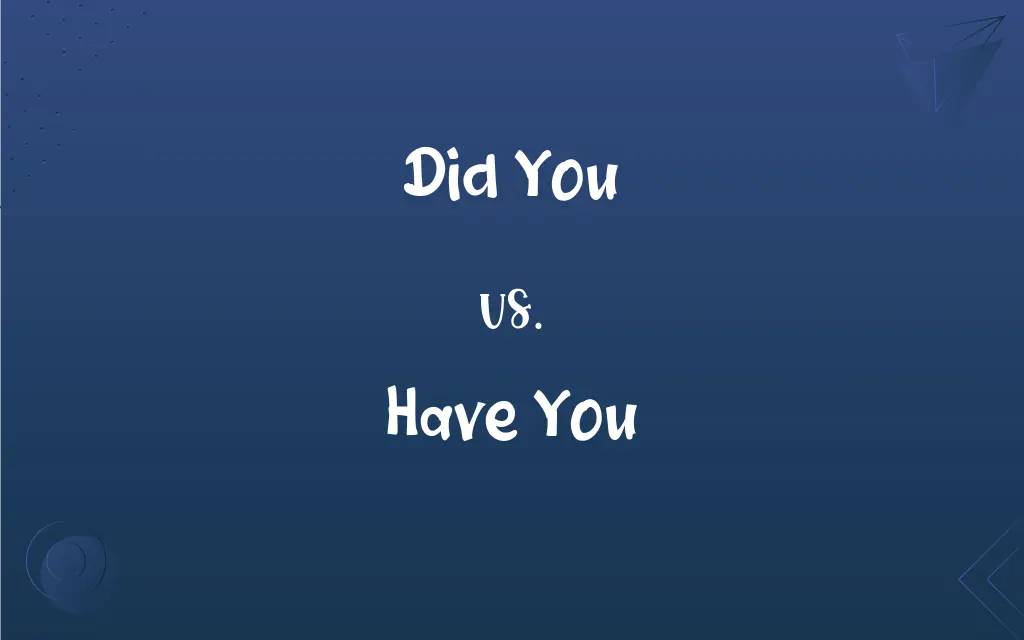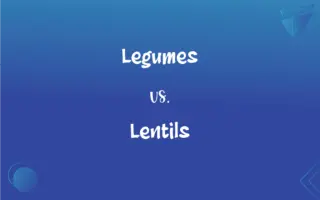Did You vs. Have You: What's the Difference?
Edited by Harlon Moss || By Aimie Carlson || Updated on October 2, 2023
"Did you" is used for simple past questions (Did you eat?). "Have you" is used for present perfect questions (Have you eaten?), indicating a connection with the present.

Key Differences
"Did you" and "have you" are both utilized to formulate questions in English, but they each align with different tenses and, therefore, communicate different temporal relationships. "Did you" aligns with the simple past, isolating the action in a finished time frame, whereas "have you" connects with the present perfect tense, suggesting a link between a past action and the present situation.
When one uses "did you," it immediately sets the action in a specific, concluded timeframe. It’s devoid of impact on the present and simply requests a confirmation or denial of the action. Conversely, "have you" embeds a continuity or relevance to the present moment, indicating that the past action has some bearing or effect on the current situation or context.
A distinction between "did you" and "have you" is that the former, with its alignment to the simple past, is often employed with a specific time marker, such as last week, in 2020, or yesterday. "Have you," while not typically used with specific time markers, suggests an indefinite timeframe wherein the exact occurrence of the action is not the focal point, but its occurrence per se and its present relevance is.
Furthermore, "did you" might be applied to provoke storytelling or to elicit more detailed responses about an event or experience. "Have you," meanwhile, might be used to query experiences in a general sense, understanding whether someone has ever been, done, or felt something at any point in their life, thereby bearing significance to their present condition or context.
Lastly, “did you” initiates a dialogue focused primarily on past activities or states. In contrast, “have you” might spark discussions that weave between past experiences and their implications or manifestations in the present, thus creating a subtle but substantial variance in conversational direction and exploration.
ADVERTISEMENT
Comparison Chart
Grammatical Tense
Simple past tense.
Present perfect tense.
Time Reference
Specific and concluded timeframe.
Indefinite, relating the past action to the present.
Usual Application
Querying about a distinct past action or event.
Asking about life experiences or ongoing results.
Example Question
"Did you visit the museum last summer?"
"Have you visited the museum?"
Impact on Present
Does not suggest a connection with the present.
Implies relevance or connection to the present.
ADVERTISEMENT
Did You and Have You Definitions
Did You
"Did you" formulates questions about specific past events.
Did you attend the concert last night?
Have You
It uses the present perfect tense, linking past actions to now.
Have you been feeling well recently?
Did You
It employs the simple past tense, referencing concluded actions.
Did you complete your homework yesterday?
Have You
"Have you" inquires about experiences with present relevance.
Have you eaten sushi before?
Did You
It is used without implicating current relevance or continuity.
Did you see that movie when it was in theaters?
Have You
"Have you" commonly asks about general, indefinite experiences.
Have you traveled outside of the country?
Did You
"Did you" can initiate recounting past experiences or stories.
Did you have a favorite book as a child?
Have You
It often probes for life experiences without a set time frame.
Have you ever seen a shooting star?
Did You
It primarily elicits confirmations or denials of past actions.
Did you send the email to the client?
Have You
"Have you" implies that past actions have bearing on the present.
Have you studied this topic previously?
FAQs
How is a negative question formed with "did you"?
Use “didn’t you?” for negative questions, e.g., "Didn't you go to the store?"
When is "did you" typically used?
"Did you" is used in forming questions in the past simple tense.
Can "did you" be used to inquire about habitual actions in the past?
Yes, "did you" can ask about regular or habitual actions that happened in the past.
Can "did you" be used to form tag questions?
Yes, e.g., "You knew that, didn’t you?"
How is a tag question formed with "have you"?
E.g., "You've met her, haven't you?"
When do we use "have you"?
"Have you" is used in forming questions in the present perfect tense.
Is "did you" formal or informal?
"Did you" is neutral and can be used in both formal and informal contexts.
Is "did you" applicable for all persons?
Yes, it is used for all persons (I, you, he/she/it, we, they) without change.
What verb form follows "did you"?
Use the base form of the verb, e.g., "Did you go?"
Can "did you" inquire about emotional states?
Yes, e.g., "Did you like the movie?"
Does "have you" indicate a specific time frame?
No, "have you" usually suggests an indefinite time period in the past.
How are short answers formed with "have you"?
Use "have" or "haven’t," e.g., "Yes, I have" or "No, I haven’t."
How do we respond to "did you" questions?
Short answers often use "did" or "didn’t," e.g., "Yes, I did" or "No, I didn’t."
How is the present perfect formed with "have you"?
Use "have/has" + past participle, e.g., "Have you eaten?"
How do we form a negative question with "have you"?
Use “haven’t” or "have you not", e.g., "Haven’t you finished yet?"
Can "have you" be used in casual conversation?
Yes, it is suitable for both casual and formal dialogues.
Can "did you" be used with non-action verbs?
Yes, e.g., "Did you know about this?"
Is "have you" affected by subject pronoun changes?
Only for he/she/it, use "has," e.g., "Has he traveled to France?"
Can "have you" be used for repeated actions?
Yes, to talk about life experiences, e.g., "Have you ever been to Paris?"
Can "have you" imply an action's relevance to the present?
Yes, e.g., "Have you done your homework?" (implying it's necessary for now)
About Author
Written by
Aimie CarlsonAimie Carlson, holding a master's degree in English literature, is a fervent English language enthusiast. She lends her writing talents to Difference Wiki, a prominent website that specializes in comparisons, offering readers insightful analyses that both captivate and inform.
Edited by
Harlon MossHarlon is a seasoned quality moderator and accomplished content writer for Difference Wiki. An alumnus of the prestigious University of California, he earned his degree in Computer Science. Leveraging his academic background, Harlon brings a meticulous and informed perspective to his work, ensuring content accuracy and excellence.































































